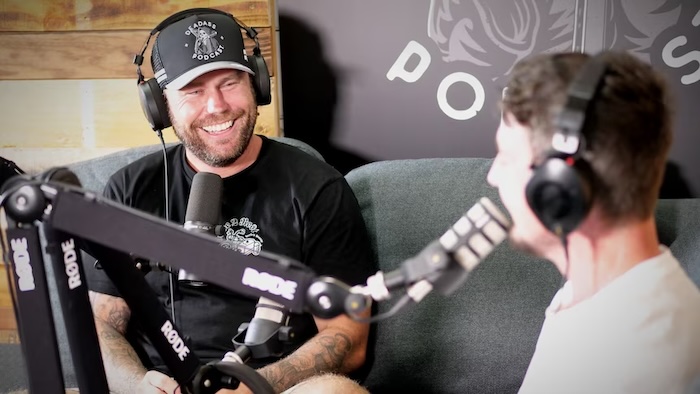
When Nicholas ‘Nicko’ Smithson was diagnosed with stage 4 cancer, he would lie awake at night terrified of dying.
The tradesman spent years labouring in the sun and was diagnosed with melanoma when he was 38 years old.
He was given just six months to live.
“I was quite petrified of whether there was life after death,” Mr Smithson said.
“They didn’t catch it (the cancer) in time … it spread throughout my entire body, my bones, my liver, everything like that.”
Mr Smithson, who lives in Rockhampton in central Queensland, underwent intense immunotherapy and two years later is in remission.
He has teamed up with his best friend, Bryan Perry, who owns a crematorium business to help demystify and start the conversation about death through their Deadass Podcast.
In denial about death
Leading palliative care researcher Adjunct Professor Elizabeth Lobb said Australians live in a “death-denying society”.
She has spent 28 years of her life dedicated to the psychological impact of oncology, palliative care and grief.
She said people avoid the topic because it is confronting and people fear the unknown.
“It’s not something that we talk about, [but] certainly when someone receives a diagnosis of cancer, it’s one of the first things that comes into their mind,” Dr Lobb said.
She said when you did not know how to respond or help those with life-limiting diagnoses, the first step was to give people a chance to talk about their feelings.
“I often say to family members that sometimes words aren’t needed, it’s just important to listen, we can’t solve this,” Dr Lobb said.
“People who are facing a life-limiting illness can become very isolated and it can be lonely because no one wants to talk about it.”
Sharing eulogies
Mr Smithson, now 40, works for the podcast creating digital content and has been featured in episodes to share his life story, or “eulogy”.
He has been warned by health professionals that his cancer could return, and he has decided he will not seek further treatment because of the harsh impact on his body.
Mr Smithson said the double doses of immunotherapy led to ulcerative colitis, and his colon had to be removed.
He said working on the podcast has helped him come to terms with death.
“It’s kind of shed a bit of light and helped ease the anxiety a little bit of, if it does end up happening, I’d be OK with that,” he said.
Mr Perry, who hosts the show, said he wanted a platform to share his mate’s story, as well as other people’s eulogies before it was too late.
“We were contemplating his own mortality and discussing some of the things we’ve done together over the years and taking the opportunity to record those memories,” Mr Perry said.
“The intentions were to either keep those or to share them and even potentially have his own funeral.”
Preparing for death
Mr Perry, who has worked in the funeral industry for more than 20 years, said people were hesitant to think about death.
He urged more people to think about it practically.
“Jot down what you want, put down what sort of songs you want, where you want to have it,” he said.
“It’s just peace of mind for the people that you’re leaving behind so that when your time does come, the family knows exactly what you want and it just lessens the burden for them.”
Dr Lobb said not everyone was able to communicate their final wishes but she recommended those who could to consider their financial affairs and where they want palliative care to take place, whether it be at home or in a hospital.
“There’s no right or wrong and it’s very individual,” she said.
“Yes, it is devastating, it’s overwhelming, but not necessarily as fearful as [it’s] perhaps being portrayed.”
Complete Article ↪HERE↩!
